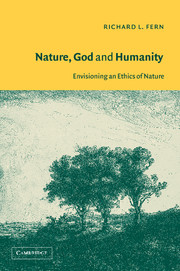7 - The fellowship of creation
Published online by Cambridge University Press: 22 September 2009
Summary
THE BIG HUG
Theistic naturalism gives those who share its formative faith reason to believe that wild nature is sentiotic. In this, as in other respects, it supports humane holism. At the same time, theistic naturalism is committed to a qualified anthropomorphism: though radically Other, God is a person, like us. It follows that reality at its core is not only analogous to human life but more like human life than any other part of nature, the most striking example of which lies in the analogy of love: humans bear witness to God in a unique way. One risk inherent in this similarity is that it will lead to a theanthropocentric disregard of wild nature, as appears in Augustine's oft-cited claim to care only for God and the human soul and Karl Barth's account of the analogia relationis.
Consider the latter. Barth, though viewing the imago Dei as communal and placing human life “within the context of creation as a whole” (1960: 286), often portrays this context as little more than background for our interaction with God: “creation sets the stage for the covenant of grace” (1958: 44). Since only humans are the covenant-partners of God (1960: 359), creation apart from humanity – despite repeated exhortations to kindness and wise use – is relegated to the status of a dispensable framework, becoming, in the words of H. Paul Santmire (1985: 155), “mainly … an object of manipulation, over against which God stands in his majestic dissimilarity.”
- Type
- Chapter
- Information
- Nature, God and HumanityEnvisioning an Ethics of Nature, pp. 201 - 241Publisher: Cambridge University PressPrint publication year: 2002



